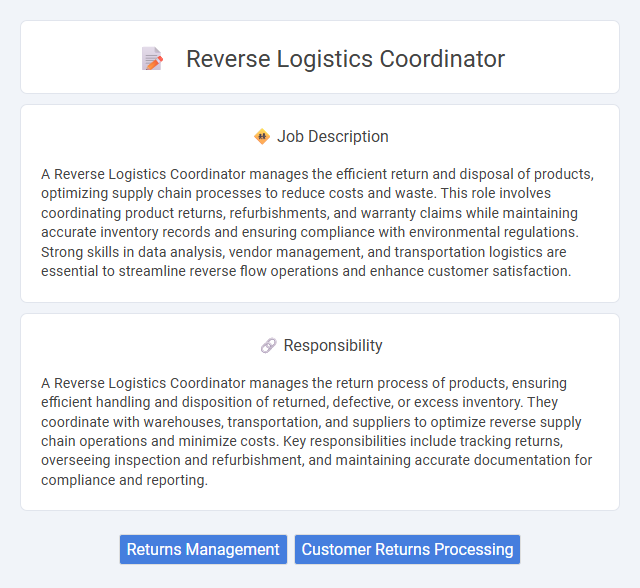
A Reverse Logistics Coordinator manages the efficient return and disposal of products, optimizing supply chain processes to reduce costs and waste. This role involves coordinating product returns, refurbishments, and warranty claims while maintaining accurate inventory records and ensuring compliance with environmental regulations. Strong skills in data analysis, vendor management, and transportation logistics are essential to streamline reverse flow operations and enhance customer satisfaction.
Individuals with strong organizational skills and a detail-oriented mindset are likely to be well-suited for a Reverse Logistics Coordinator role. Those who thrive in dynamic environments and possess problem-solving abilities might find the challenges of managing returns and inventory flow manageable and engaging. People who prefer repetitive or solitary tasks may struggle with the multi-faceted communication and coordination demands typical of this position.
Qualification
A Reverse Logistics Coordinator should possess strong analytical skills and expertise in supply chain management to optimize the return and refurbishment processes. Proficiency in inventory management software, data analysis, and knowledge of transportation logistics are essential for handling product returns efficiently. Certifications such as APICS CPIM or CSCMP can enhance qualifications, demonstrating a solid understanding of reverse logistics frameworks and regulatory compliance.
Responsibility
A Reverse Logistics Coordinator manages the return process of products, ensuring efficient handling and disposition of returned, defective, or excess inventory. They coordinate with warehouses, transportation, and suppliers to optimize reverse supply chain operations and minimize costs. Key responsibilities include tracking returns, overseeing inspection and refurbishment, and maintaining accurate documentation for compliance and reporting.
Benefit
A Reverse Logistics Coordinator likely enhances operational efficiency by managing product returns and minimizing waste, which could lower costs and improve sustainability efforts. There is a chance that this role supports customer satisfaction through timely and accurate processing of returns and exchanges. It may also contribute to generating valuable data for better inventory and supply chain management.
Challenge
Managing reverse logistics as a coordinator likely involves complex challenges related to tracking returned products, optimizing inventory flow, and ensuring efficient transportation processes. The role may require solving unpredictable issues such as damaged goods, varying return reasons, and compliance with environmental regulations. Coordination with multiple departments and external partners probably presents ongoing obstacles demanding strong problem-solving skills and adaptability.
Career Advancement
A Reverse Logistics Coordinator manages the efficient return and disposal of products, ensuring compliance with company policies and regulatory standards. Mastery in data analysis, supply chain management, and vendor coordination significantly enhances opportunities for career advancement into roles such as Operations Manager or Supply Chain Director. Continuous skill development in logistics software and sustainability practices further positions professionals for leadership roles in the reverse logistics domain.
Key Terms
Returns Management
A Reverse Logistics Coordinator specializes in managing the efficient return of products from customers to warehouses or manufacturers, ensuring compliance with company policies and regulatory requirements. They oversee returns processing, inspect returned items for quality assessment, and coordinate with inventory control to optimize stock replenishment or disposal. Effective returns management reduces operational costs, enhances customer satisfaction, and supports sustainability initiatives through proper handling of returned goods.
Customer Returns Processing
A Reverse Logistics Coordinator oversees the efficient processing of customer returns, ensuring accurate inspection, sorting, and disposition of returned products. They collaborate with warehouse teams to streamline reverse flow operations, minimize losses, and improve customer satisfaction by facilitating timely refunds or replacements. Expertise in inventory management systems and compliance with return policies is essential for optimizing reverse logistics performance.
 kuljobs.com
kuljobs.com